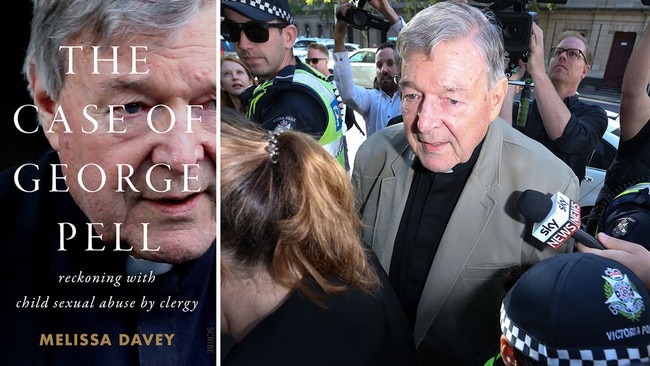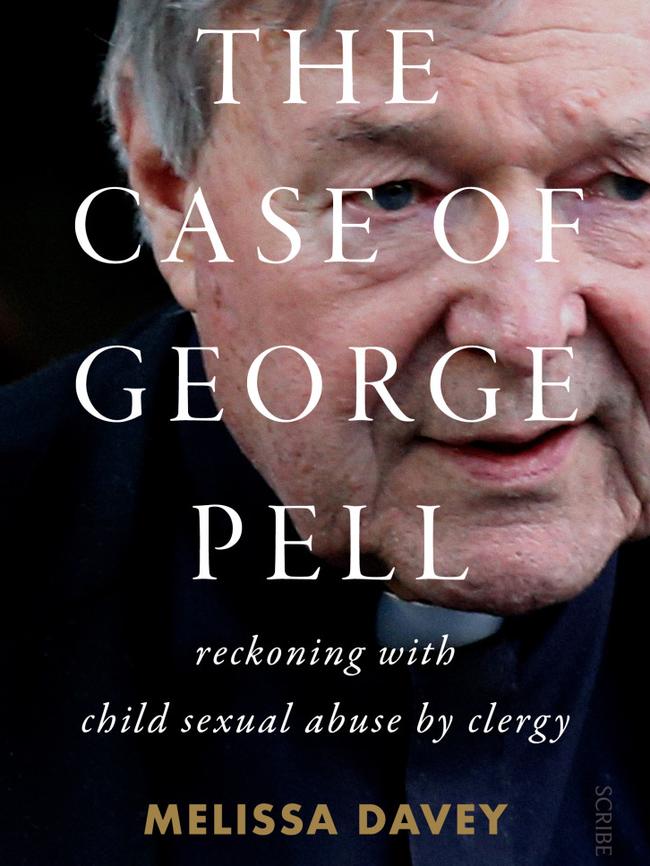Book review, The Case of George Pell: Reckoning with Child Sexual Abuse by Clergy
Melissa Davey’s book about George Pell is undercooked. Four months between verdict and publication were not enough.

Melissa Davey sat through every minute of the five court events that comprised the George Pell sexual abuse case. At the end of the third, and after sentence had been passed, she decided to write a book on the case.
She then went to New Zealand for some R&R. It was just in time to be a reporter on the ground for the Christchurch mosque massacre. “I returned to Melbourne exhausted and broken,” she writes, “I had a mental breakdown.”
But she somehow got back on her horse to cover the two Pell appeals and continued writing her book. At the end of The Case of George Pell she has an unusual author’s note: she details that in November and December last year, while she was still writing, she was hit by two traumatising events, each emotional and physical. The year was certainly her annus terribilis, and this can’t be forgotten in any analysis of her book.
The book is problematic, and interestingly so. In micro form the story of the case is Pell charged, Pell acquitted. The narrative direction of Davey’s book, however, runs counter to this. In crude terms the sides line up and the “goodies” are heading towards a triumph. Mind you, the alignment is in place even before the legal process gets under way and before Davey starts to record it. Pell is not a sympathetic public figure. As a private man there are testimonies to him being engaging. But his public persona is unattractive. He is tone deaf and arrogant. In the pulpit, the podium and the witness box he is charmless and stale and smug. Add to all these handicaps a charge of sexual abuse, and Pell is up against it. He’s behind all the way. Only at the death does he get his head in front. As Davey’s book starts, the opposite corner is occupied by the complainant, a family man in his 30s who is speaking of himself as a 13-year-old victim of abuse. Although very few people saw this man testify, what has now become the widespread perception is that he was a credible, honest and intelligent witness. Understandably Davey’s sympathies are with him.
What’s more, in the wash-up of the whole process he issues statements that are generous, forbearing, quite without rancour; in fact, nothing less than noble and moving.
The current of Davey’s narrative, however, is set. The prosecutor in the two trials, Mark Gibson, is “calm and measured”. The defence counsel, Robert Richter, is “condescending and loud” and “flamboyant”, and “laboured each point” and was “sometimes hard to follow to a conclusion”.

What’s more, he has to be taken to task by judge Peter Kidd (who turns out to share hero status in the book — and deservedly so — with the complainant). Gibson’s closing address to the jury in the second trial was “thorough, powerful and easy to follow”. Richter receives no such unreserved commendation.
The pattern continues. The defence’s crucial witness, Monsignor Charles Portelli, “seemed to be someone whom jurors might reasonably and justifiably have perceived as being a willing and eager participant in Richter’s line of questioning, and close to Pell”. Mmm. So it goes on, an undercurrent to an absorbingly told courtroom drama.
Bret Walker, when he comes on the scene as defence counsel for the appeals, is “verbose”, has Davey reaching for her dictionary, and “most famously represented the tobacco industry”. Whereas of Kerri Judd, Walker’s final opponent, Davey says “no one had anything bad to say about her. She was described as a professional, formidable and whip-smart.”
Threading this rollcall of the sympathetic and the unsympathetic are epigraphs to the chapters — half of them statements from the royal commission, others from victims or people connected to victims — statements of revulsion or condemnation. Nothing to do with the Pell case as such. The impetus, the motivation, of the book is stark.
Then the High Court acquits Pell. The book’s narrative judders to a halt, off the rails. Where to now? Clearly unhappy with this outcome, Davey assembles some sympathetic opinions, including from a legal academic who says: “What’s to say the High Court had it right?”
She juxtaposes the freed Pell’s comments to Andrew Bolt with the complainant’s final statement, then she gives another run to the more convincing allegations that Pell must have turned a blind eye to the abuse in the church.
That done, she gives us two final chapters, Victims and Perpetrators. These are informative and suggestive, but Davey herself comments “these topics merit entire books in and of themselves”.
Indeed yes, but the present book is out of control at this stage. It’s evident in the disjunction between title, The Case of George Pell, and subtitle. Reckoning with child sexual abuse by clergy is not done by lengthy examination of one case where a clergyman is not proven to have been an abuser.
On the other hand, if the case of Pell is to be fully explored, it requires some consideration of how the case came to be brought and the role of the Victoria Police. Widespread and educated members of the Catholic community, and not only Catholics, believe there was a conspiracy to get Pell.
Even Davey’s own paper, Guardian Australia, lends some credibility to this. A December 2015 article was headlined “Victoria Police Seek Victims of Sexual Assault at St Patrick’s cathedral”. Sounds suspiciously like a fishing expedition.
This aspect of the case demands to be covered — and, yes, the coverage might well end in a forensic demolition of the theory.
All things considered, Davey should have been allowed more time to rework her book. Four months between verdict and publication were not enough.
Partisanship on this issue seems endemic. For all the questions that I and my fellow Catholics might have about this concentration on our church, one grim fact confronts us.
These myriad clergy abusers were men whose vocation was service and whose profession was centrally the proclamation and exemplification of loving goodness. All the more terrible and destructive their corruption.
Gerard Windsor’s books include The Tempest-Tossed Church: Being a Catholic Today. The Case of George Pell: Reckoning with Child Sexual Abuse by Clergy by Melissa Davey (Scribe, 423pp, $35).


